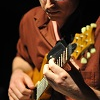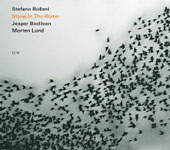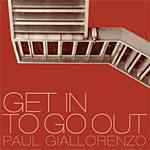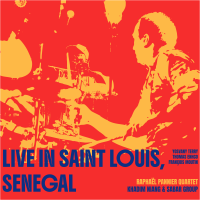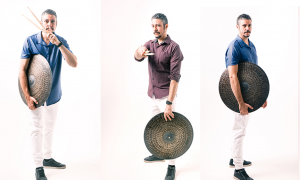Home » Jazz Articles » Interview » Jonathan Kreisberg: Unearthed
Jonathan Kreisberg: Unearthed
In a day and age when it seems that jazz, and jazz guitar, has been through just about every transition, amalgamation and innovation possible, there are still new voices emerging to take the music forward into unexplored and exciting territory. One of the guitarists that is leading this charge is New York-based picker Jonathan Kreisberg. With a strong foundation in the jazz tradition, and a personal vision of the genre's future, Kreisberg is winning over crowds and critics alike with his albums and concerts held around the world.
Kreisberg's playing is not easily categorized, as it draws upon a diverse background of influences, and is constantly challenging the defined conception of modern jazz. His solos portray a player dedicated to absorbing the traditional vocabulary and vernacular of the jazz idiom, skills honed through a solid musical education and by studying on bandstands across the globe. Drawing the listener in with a healthy dose of swing and traditional vocabulary, Kreisberg acts as a skillful guide as he leads his audiences into new and entrancing harmonic and melodic territory, without ever sounding abrasive or disjointed.
This ability, to smoothly transition between established and inventive sonic ground, has helped raise Kreisberg to the upper echelon of today's jazz guitarists, and has firmly established his position one of the genres leading voices.
Apart from being an accomplished improviser and band leader, 2009's Night Songs (Criss Cross) is his sixth outing under his own name, Kreisberg is also a composer and arranger of merit that is continually exploring the possibilities of small group jazz. Kreisberg's albums, like his improvisations, contain a mixture of tunes drawn from the jazz tradition and his own original compositions.
Even when an album contains tunes that are one or the other, such as Night Songs which is a collection of jazz ballads or Unearth (Mel Bay Records, 2005) which is all original compositions, there is still a sense of Kreisberg's dual approach to writing and arranging found within his work.
When approaching a jazz standard, Kreisberg is rarely content to play the track in its original context. Instead, he is constantly looking for new ways to interpret many of the genre's classic tunes, such as his odd-meter rendition of "Stella by Starlight" from the album South of Everywhere (Mel Bay, 2007). On the other side of the coin, Kreisberg's original compositions will often have a sense of the jazz tradition weaving in and out of more modern sounding harmony and melodic phrases, such as the hard-driving composition "Fever Vision" from his 2004 release Nine Stories Wide (Criss Cross, 2005).
With such an array of accomplishments behind him, Kreisberg is showing no signs of slowing down. He is continuing to tour in support of Night Songs and is already at work on his next recording project. With such a busy schedule of performing, writing and recording, it's no wonder that Kreisberg has become one of the genre's young stars, a status that is sure to stick as he moves forward into his musical future.
All About Jazz: You began playing guitar at 10 years of age. How were you introduced to the instrument and had you always been interested in playing guitar?
 Jonathan Kreisberg: I grew up listening to a lot of great jazz, rock, and classical by way of my folks. They listened to John Coltrane, Miles Davis, and Dave Brubeck, things that I liked, as well as some classical guitar stuff, like John Williams playing the Aranjuez concerto.
Jonathan Kreisberg: I grew up listening to a lot of great jazz, rock, and classical by way of my folks. They listened to John Coltrane, Miles Davis, and Dave Brubeck, things that I liked, as well as some classical guitar stuff, like John Williams playing the Aranjuez concerto.I initially picked up a guitar after hearing Eddie Van Halen's playing on "Eruption." I was blown away by that great "other worldly" sound he was getting out of his guitar.
It's funny because years later I would realize that Eddie was reaching out for the sounds he'd heard from Allan Holdsworth, who was in turn channeling Coltrane. One of my childhood favorites was Coltrane's album "My Favorite Things," so I guess it all makes sense in a weird sort of way.
AAJ: Who were some of your early influences on the guitar? Were you listening to jazz at this time, or did your exploration of jazz music and musicians come later on?
JK: As I mentioned, I had heard a fair amount of jazz, but it was a bit strange and out of reach for me. I didn't really make the connection right away between the guitar and jazz. My influences on guitar at the time were Van Halen, Eric Clapton and classical composers such as Bach, but I would say that I began writing tunes and improvising pretty much right away though, so the creative thing was there and it would push me towards jazz eventually.
AAJ: When you were 16 you were admitted to the New World School of the Arts in Miami. Can you talk about how this experience changed you both musically and personally?
 JK: It was definitely a big change on both levels. There were some really talented people there who were already delving deep into the jazz tradition. I came along with plenty of creativity and chops, but basically got a major wakeup call in regards to the importance of knowing the jazz language. It was really good for me as a player. I had a great teacher named J.B. Dyas, who helped me structure my practicing and shifted my focus to learning tunes and absorbing the jazz language.
JK: It was definitely a big change on both levels. There were some really talented people there who were already delving deep into the jazz tradition. I came along with plenty of creativity and chops, but basically got a major wakeup call in regards to the importance of knowing the jazz language. It was really good for me as a player. I had a great teacher named J.B. Dyas, who helped me structure my practicing and shifted my focus to learning tunes and absorbing the jazz language.AAJ: After graduating from high school, you were awarded a scholarship to attend the University of Miami. Can you talk about your decision to attend college, instead of pursuing your professional career right out of high school, and what you felt you learned in school that helped you once you moved to New York?
JK: I had actually thought about just playing and maybe moving to New York right out of high school. In hindsight, it would've been too early and I really learned a lot during my time at UM. Randall Dollahon, who I studied with, was a great teacher. I also met the guys that would become my first trio, and we had some great times playing and hanging together.
AAJ: Your first post-college trio was an electric group based out of Miami. Who were the other members of this first trio, and how did you meet these musicians?
JK: The group was bassist Javier Carrion and drummer Vince Verderame, we played together in a band called Third Wish that was kind of a progressive rock thing with a lot of intricate writing and improvising. We started playing gigs on the side as my jazz trio and realized something special was happening. We ended up touring the East Coast a bit, and I think I really began forming my identity as an artist and band leader at that point. We were also the best of friends and had a great time jamming and hanging.
AAJ: After finding success with your electric trio, you opened for Steve Morse and George Benson among others, you felt the need to move from Miami to New York. What were the factors that necessitated this move, and did the change of scenery affect you musically?
JK: Having been born in New York, it really felt like it was about getting back to my roots. This was true on a personal level, but also as a student of jazz. The emphasis put on the importance of swinging and learning the jazz language was really heavy in New York at that time, so it all just happened naturally.
Living in Miami, I had become a bit too focused on the texture and communication aspects of music. I just wanted to delve deeper into the tradition and work on the craft of being a jazz musician. At that time I began playing a lot with Ari Hoenig and Johannes Weidenmueller.
We recorded a disc called Trioing (New for Now Music, 2000) that documented what we were up to musically at that time in our careers. Years later, I got a lot of cats telling me how much they dug and were influenced by that record, and I had barely finished paying for the mix-down by selling some of the amps that I had used in Miami [laughs].
AAJ: You have recorded and performed in many different ensemble configurations, from organ trios to acoustic quintets and more. How does a change in the size and make-up of your ensemble affect the way you approach the music, as both a composer and improviser?
JK: Playing in different size ensembles definitely effects my role as a guitarist. For instance, if there is another harmonic instrument, such as piano or organ, obviously it will change if and how I approach playing chords.
Every situation is unique in this respect. I might play things differently depending on who is playing piano, or what the audience's energy feels like, or what kind of mood the band is in that day. That's the organic beauty of jazz. It's a real living music.
 AAJ: Now that you have spent a number of years performing mostly in acoustic groups is this where you see yourself musically for the foreseeable future, or can you envision a time in the future when you return to a more electric based group?
AAJ: Now that you have spent a number of years performing mostly in acoustic groups is this where you see yourself musically for the foreseeable future, or can you envision a time in the future when you return to a more electric based group?JK: It's tough to say. My group now already straddles the acoustic-electric zone a bit. I sometimes use effects on my guitar, and we've used the Fender Rhodes, for example.
The only major difference would probably be to use an electric bass, but that always seems to change up the overall feel of the band. My main issue with the electric bass is the lack of dynamics. In my experience, the acoustic bass seems to provide a more organic feel, and makes the drummer approach things differently. With the electric bass, the drummer seems to go into "lock up the kick with the bass" mode and becomes a bit more heavy-footed.
I tend to prefer bass players who grew up with some experience playing and getting a sound on an electric. That way when they play upright, they can really get the groove thing happening and use the amp on some tunes. They know what it's supposed to feel like. Then you can go wherever the music takes you.
AAJ: Apart from your work as a bandleader, you have also worked as a sideman alongside some of the biggest names in jazz, including organist Dr. Lonnie Smith. How did you first meet Smith?
JK: I actually saw the Doc play in Miami when I was a kid. He was laying low and playing piano for a few years down there. I thought, "Man, that pianist is a bad dude!" It's funny, at the time I didn't realize exactly who he was and that I was already listening to him on organ and some totally burning Benson stuff I had from the '60s. Then of course I was kicking myself years later for not camping out on his front porch until he'd show me some of his tunes [laughs].
AAJ: You were an accomplished performer before you began playing with Smith. What have you learned, both musically and professionally, from playing in Smith's group?

JK: Oh, man, I've learned so much. The first thing is the importance of the blues. I mean, Doc's the real deal when it comes to the blues. So I'm just trying to absorb some of that, and of course there's his time feel. He's an original funkmaster who swings like nobody else can.
Another thing, which was a reconfirming rather than new thing for me, was to see this legend of jazz embrace such a wide range of influences within his music. I mean our shows go from the most intimate ballad to a screaming post-apocalyptic psychedelic rock tune [laughs].
I feel like this trio really travels through a great range of music on a really organic journey. It's like I was mentioning with the bass thing, Lonnie can go anywhere and it's always the real deal.
AAJ:You choose a bit of a larger group, a quintet, for your CD Unearthed, as compared to some of your other albums which are trio-based. Was this a result of the compositions, or were the compositions a result of the quintet set up?
JK: It's a bit of a chicken or the egg situation, really. I wrote some tunes specifically for a quintet, and I was really enjoying where this was going on the gigs. Next thing I knew I had an album waiting to be recorded. So I actually fronted the money to record the album. Afterwards, I was lucky to have Mel Bay buy it and release it on their new label. It was great luck for me, but the process took a while, that's why it came out after my first two records on the Criss Cross label, even though it was actually recorded before them.
AAJ: Unearth is a great example of your ability to mix the jazz tradition with a forward sense of the genre. Your lines and ideas always seem to be well rooted in the traditional vocabulary, yet they have a uniqueness that is all their own. How important was it to you to learn the bebop vocabulary when you were coming up, and do you feel that has helped you now as you explore new and exciting musical territories?
JK: Bebop, and the jazz tradition in general, is a huge part of my music. But within that tradition, it's been the innovators that I've been drawn to the most, guys like Charlie Parker, Coltrane, Lennie Tristano, Thelonious Monk, Miles etc. There are guys that are among us that are continuing that tradition. That's where that title of my record New for Now came from, the idea that innovation has the effect of always sounding fresh, even a hundred years later. I'm always trying to be open to those kinds of sounds.
AAJ: What was it like recording with Bill Stewart and FLY, who have both become regulars in the groups of some of the best jazz guitarists on the scene today, on your album Nine Stories Wide?
JK: Those guys were already playing with Metheny and Scofield, not to mention many of the other greats, so it was definitely intimidating. But nerves are just energy, so if you can focus it correctly, it can make for great playing. That's always a challenge in a new situation like that.
My favorite take on that record is probably "Relaxin' at Camarillo," which we recorded as a quick last take before Larry had to run to the Vanguard to play with Brad Mehldau. I think the energy in that moment translated nicely onto the recording.
AAJ: For your album New for Now, you choose to use the organ trio formation. What is it about the organ trio that draws you to that lineup?
JK: The organ trio sound is a real particular thing, and I have a great respect for it. The trio with Gary and Mark was touring a lot at the time, and I felt we were coming at the organ trio concept from a different angle than the tradition, and it was something that was worth documenting. Once again, it was the music on the gigs first, and then the decision to record what was happening came afterward.
AAJ: Jazz guitar albums can sometimes end up sounding like blowing sessions, but your album The South of Everywhere is very carefully arranged and well put together from a musical standpoint. Is this something you think about when putting an album together?
JK: Thanks for noticing. It was really important on that record that I could take the listener someplace new. Of course I wanted to feature all the great individual musicians, but it was more about creating a world where the band could then do their thing. I'm really happy with the mood of the record. It really captured the feeling of my life at that time.
AAJ: On the album's title track, you use a volume pedal to produce a very ethereal vibe during the song's intro. Although other guitarists such as Ben Monder and Bill Frisell have used volume pedals in their playing, you have a unique approach to the sounds you can produce with the pedal. Can you talk about why you like to use the volume pedal in your playing, and what you feel it adds to your compositions and improvisations?
 JK: One main reason I use a volume pedal is that I often try to hear my place in the band and find the sweet spot in the "mix." By producing records, I've become pretty sensitive to that. Those types of sounds can be done with your hands, but the pedal gives you a way to do it without changing your attack, which can be a different sound all together.
JK: One main reason I use a volume pedal is that I often try to hear my place in the band and find the sweet spot in the "mix." By producing records, I've become pretty sensitive to that. Those types of sounds can be done with your hands, but the pedal gives you a way to do it without changing your attack, which can be a different sound all together.Another reason is that it can give you a bit of air, or swell. You can make the guitar sound a bit more like a violin or horn, but that's tricky. Overall, I just feel it makes the guitar sound a bit more organic.
AAJ: On the song "Stella by Starlight," you lay down a very elegant chord-melody introduction that provides the listener with a window into that side of your playing. Do you play solo guitar often, and have you ever considered recording an album of solo guitar pieces?
JK: At some point it would be fun, but I'd have to give some thought as to how I'd approach it. I have a lot of respect for that tradition as well, solo guitar. The main issue for me is about trying to strike a balance between arrangements and improvisation.
It's a shame most guys end up arranging too much and trying to sound like a bassist, pianist and horn all at once. There is so much freedom as a solo guitarist to have fun with the keys, tempos, lines etc.
AAJ: Your 2009 CD is the quartet recording Night Songs that was released on the Criss Cross label. While you have recorded for Criss Cross in the past, your last few albums were for the Mel Bay label. What brought you back to the Criss Cross label for this recording?
JK: Well, Criss Cross is a great label with such a quality roster, so of course it's always great to work with them. When Producer Gerry Teekins called, I'd been writing some new originals that I was really excited about, but I wasn't quite ready to go into the studio for that stuff. So we got excited about the concept, which became Night Songs.
AAJ: Night Songs is a collection of jazz and American songbook ballads. What was the inspiration for releasing an album of ballads?
JK: It was a heartbreak-induced episode, and an excuse to record a bunch of my favorite tunes. Also, it seemed like a great challenge to make a compelling disc entirely of ballads. I was thinking of the concept as a whole throughout the process. Hopefully, that translated well onto the recording.
AAJ: You use an acoustic guitar on some of the tracks on the album, on "Laura" for example. Though others have used an acoustic guitar in a jazz setting, it is still a rare sound. What was the inspiration to bring the acoustic guitar sound to your new CD?
JK: Well, I'd already played acoustic on Unearth, so it wasn't the first time I'd experimented with that sound, but it definitely was used more often on this record. It's really just about another color that I can use in my playing and writing.
AAJ: The songs on Night Songs have a very "organic" feel to them. How much time did you spend in the studio recording the album? It sounds as if you guys are just playing live and having a great time laying down each track.
JK: Well, Criss Cross albums are generally done in about 6 hours, so it was definitely a very "live" session. Some tunes were a bit more arranged like "Spring is Here," while others were completely off the cuff. We had never even played "Nefertiti" or "September Song" as a band before, so those were both one-take wonders.
AAJ: What guitars and amps did you use to record Night Songs?
JK: My acoustic is a Collings, my electric is my semi-trusty Gibson 175 and the amp is my blackface Fender Princeton.
AAJ: With your latest album receiving positive reviews from critics and fans alike, are you already working on your next recording project, and if so what can people expect?
JK: There are already some clips on YouTube of some of my new music, so my die-hard fans have already checked some of it out. I've heard via email how excited they are about it, so that's really been inspiring.
I guess it's been interesting coming to terms with YouTube, show taping, downloading, etc., in the past few years, but it really does have its positives. The true fans are really with you through the process. That being said, of course it will be great to go into the studio to officially document the new music. I'm looking forward to it.
AAJ: After accomplishing so much as a composer and performer at such an early stage in your career, where do you see yourself as a musician over the long term? Are there any projects or genres of music that you would like to incorporate into your writing or improvising that you have not yet had the chance to do?
JK: For sure, I want to continue expanding the concepts I've explored in my band, I could spend a lifetime doing that. But there are always such great lessons to be learned playing in situations with different parameters than the ones I've personally created as a composer or band leader.
I recently played a bit in Paris with the incredible Brazilian guitarist Nelson Veras, and we had so much fun that we are talking about more shows and some recording. In that duo situation, you have to call upon completely different instincts, compared to playing with a full ensemble.
Let's see, definitely looking forward to more gigs and learning experiences with Dr. Lonnie Smith, Ari Hoenig's Punk Bop and Joe Locke. I also love working with singers of all styles, and hope to eventually record material ranging from a solo setting to a big band. I better get to work.
Selected Discography
Jonathan Kreisberg, Night Songs (Criss Cross, 2009)
Jonathan Kreisberg, The South of Everywhere (Mel Bay, 2007)
Joe Locke, Sticks and Strings (Music Eyes, 2007)
Jonathan Kreisberg, Unearth (Mel Bay, 2005)
Jonathan Kreisberg, New for Now (Criss Cross, 2005)
Jonathan Kreisberg, Nine Stories Wide (Criss Cross, 2004)
Photo Credits
Page 1 (top): Jimmy Katz
Page 3 (top): Noah Shaye
Page 3 (bottom): George Schiavone
Pages 4, 5: Nadja von Massow
Featured Story: Jonathan Kreisberg MySpace page
Tags
Jonathan Kreisberg
Interview
Matthew Warnock
United States
Charlie Christian
Johnny Smith
Wes Montgomery
pat metheny
John Scofield
Coltrane
Miles
Brubeck
John Williams
Allan Holdsworth
Clapton
Steve Morse
george benson
ari hoenig
Johannes Weidenmueller
Dr. Lonnie Smith
Bird
Tristano
Monk
Bill Stewart
Larry Grenadier
brad mehldau
Ben Monder
Bill Frisell
Joe Locke
PREVIOUS / NEXT
Support All About Jazz
 All About Jazz has been a pillar of jazz since 1995, championing it as an art form and, more importantly, supporting the musicians who make it. Our enduring commitment has made "AAJ" one of the most culturally important websites of its kind, read by hundreds of thousands of fans, musicians and industry figures every month.
All About Jazz has been a pillar of jazz since 1995, championing it as an art form and, more importantly, supporting the musicians who make it. Our enduring commitment has made "AAJ" one of the most culturally important websites of its kind, read by hundreds of thousands of fans, musicians and industry figures every month.

